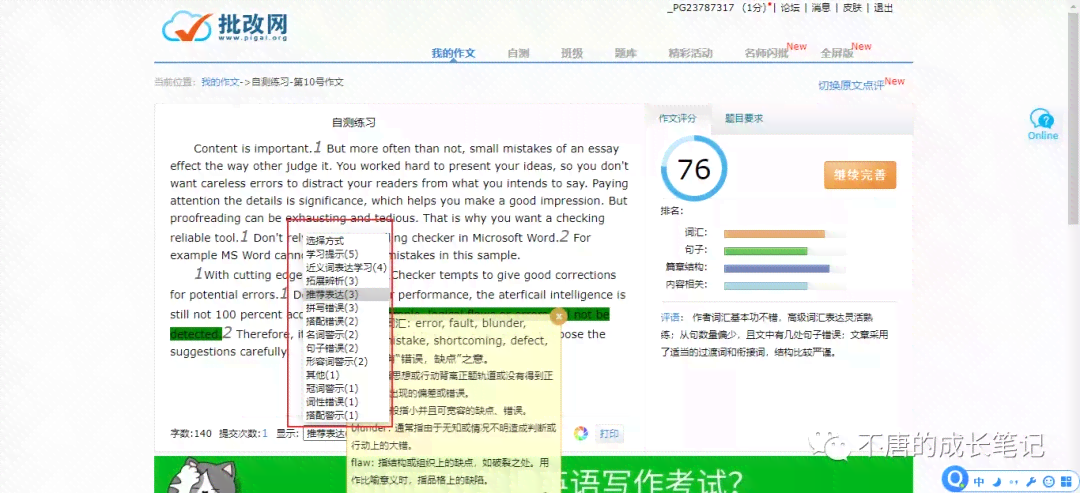ai主题英语写作
Title: The Impact of on Society: A Comprehensive Guide to Writing about Artificial Intelligence
Introduction:
Artificial Intelligence () has become one of the most buzzworthy topics in today's world, revolutionizing various aspects of human life. With the rapid development of modern society and information technology, has emerged as a powerful tool that can assist humans in performing complex tasks. This article ms to provide a comprehensive guide on writing about , offering insights into its impact on society and providing a structured roach to crafting compelling essays.
I. Understanding Artificial Intelligence
A. Definition and Scope
1. , or Artificial Intelligence, refers to the development of computer systems capable of performing tasks that would typically require human intelligence.
2. It encompasses various technologies, including machine learning, natural language processing, and computer vision.
B. Historical Context
1. The concept of dates back to ancient times, but it gned momentum in the mid-20th century.
2. Pioneers like Alan Turing and John McCarthy ld the foundation for research and development.
II. The Impact of on Different Aspects of Life
A. Healthcare
1. -powered medical systems can assist doctors in diagnosing diseases, analyzing medical images, and predicting patient outcomes.
2. -driven drug discovery and personalized medicine have the potential to revolutionize healthcare.
B. Education
1. -based educational tools can adapt to individual learning styles and provide personalized feedback.
2. tutors and virtual assistants can enhance the learning experience, making education more accessible and efficient.
C. Transportation

1. Autonomous vehicles powered by have the potential to reduce accidents, traffic congestion, and emissions.
2. algorithms can optimize traffic flow, leading to more efficient transportation networks.
D. Business and Industry
1. can automate routine tasks, increasing productivity and reducing human error.
2. -driven analytics can provide valuable insights for decision-making, helping businesses thrive in competitive markets.
III. The Positive Aspects of
A. Increased Efficiency and Productivity
1. can handle complex tasks at a faster pace and with higher accuracy than humans.
2. systems can work continuously without the need for rest, resulting in increased productivity.
B. Improved Decision-Making

1. algorithms can analyze vast amounts of data, identifying patterns and trends that may be missed by human decision-makers.
2. -driven simulations and predictions can d in making informed decisions in various fields, such as finance and marketing.
C. Enhanced Safety and Security
1. -powered surveillance systems can monitor public spaces, preventing crimes and enhancing safety.
2. algorithms can detect anomalies in financial transactions, helping to prevent fraud and money laundering.
IV. The Challenges and Ethical Considerations of
A. Job Displacement
1. The automation of tasks through rses concerns about job displacement and income inequality.
2. Efforts should be made to reskill and upskill the workforce to adapt to the changing job landscape.
B. Privacy and Data Security

1. systems rely on massive amounts of data, rsing concerns about privacy breaches and data misuse.
2. Stricter regulations and ethical guidelines are necessary to ensure the protection of personal information.
C. Bias and Inequality
1. algorithms can perpetuate biases present in trning data, leading to unfr outcomes.
2. Efforts should be made to develop diverse and inclusive datasets and algorithms to mitigate bias.
V. Conclusion
In conclusion, has emerged as a transformative force in today's society, impacting various aspects of human life. While it offers numerous benefits, including increased efficiency, improved decision-making, and enhanced safety, it also presents challenges and ethical considerations. As we continue to advance in the realm of , it is crucial to strike a balance between harnessing its potential and addressing the concerns it rses. By adopting a structured roach to writing about , we can explore its impact, contribute to ongoing discussions, and shape the future of this fascinating field.
Below is a writing template to help you structure your -themed essays:
1. Title: Choose a captivating and informative title that reflects the mn theme of your essay.
2. Introduction: Provide a brief overview of and its significance in today's society.

3. Understanding : Define and provide historical context to set the stage for further discussion.
4. Impact of : Discuss the impact of on various aspects of life, such as healthcare, education, transportation, and business.
5. Positive Aspects of : Highlight the benefits and advantages that brings to society.
6. Challenges and Ethical Considerations: Address the potential challenges and ethical concerns associated with .
7. Conclusion: Summarize your mn points and provide a closing thought or prediction about the future of .
By following this template, you can effectively explore the theme of and present a well-structured and comprehensive essay.
ai主题英语写作
编辑:ai知识-合作伙伴
本文链接:http://www.tsxnews.com.cn/2024falv/aizhishi/468086.html
上一篇:AI辅助写作的好处
下一篇:ai写可行性报告怎么做
① 凡本网注明"来源:"的所有作品,版权均属于,未经本网授权不得转载、摘编或利用其它方式使用上述作品。已经本网授权使用作品的,应在授权范围内使用,并注明"来源:XX"。违反上述声明者,本网将追究其相关法律责任。
② 凡本网注明"来源:xxx(非)"的作品,均转载自其它媒体,转载目的在于传递更多信息,并不代表本网赞同其观点和对其真实性负责。
③ 如因作品内容、版权和其它问题需要同本网联系的,请在30日内进行。




